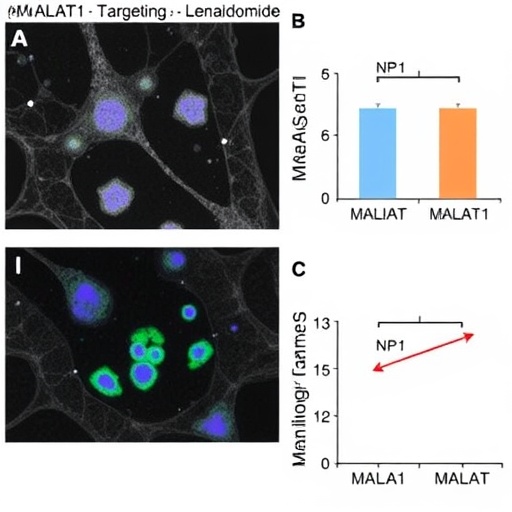In a groundbreaking study published in the Journal of Translational Medicine, researchers have unveiled new strategies targeting long non-coding RNA (lncRNA) MALAT1 to combat the resistance that often develops against lenalidomide, a critical treatment for multiple myeloma. This hematological malignancy, which primarily affects the plasma cells in bone marrow, poses a significant challenge in oncology due to its propensity for resistance to therapeutic interventions. The research indicates a multifaceted approach that engages the modulation of CD38, oxidative stress, and the pro-tumor microenvironment, offering hope for a more effective treatment pathway for multiple myeloma patients facing lenalidomide resistance.
The role of lncRNA in cancer biology has recently garnered attention, particularly its involvement in the regulation of gene expression and cancer progression. MALAT1, a prominent lncRNA, has been associated with various malignancies, including multiple myeloma. The current research underscores the relevance of MALAT1 in mediating lenalidomide resistance. By investigating how targeting this lncRNA can reverse resistance mechanisms, the study opens new avenues for therapeutic interventions and could potentially redefine treatment protocols for those affected by this disease.
Lenalidomide, an immunomodulatory drug, has been pivotal in enhancing survival rates among multiple myeloma patients. However, a subset of patients demonstrates resistance, leading to treatment failure and disease progression. Understanding the molecular underpinnings of this resistance is crucial for developing alternative strategies that may facilitate better patient outcomes. The study highlights that by targeting MALAT1, researchers can effectively reduce resistance to lenalidomide, thereby improving its therapeutic efficacy.
The mechanistic insights reveal that MALAT1 exerts regulatory effects on CD38, a cell surface protein that plays a crucial role in immune response modulation. CD38 has been a therapeutic target in multiple myeloma treatment due to its connection with tumor microenvironmental factors. The study elucidates that modulation of CD38 through MALAT1 targeting leads to epigenetic changes that disrupt the cancer-promoting signals, making the tumor cells more susceptible to lenalidomide’s effects.
In addition to its impact on CD38, the research proposes that MALAT1 influences cellular responses to oxidative stress, a condition that results from an imbalance between reactive oxygen species production and antioxidant defenses. Cancer cells often exhibit elevated oxidative stress levels, contributing to their survival and proliferation. By targeting MALAT1, the study shows that oxidative stress-mediated cell death can be enhanced, pushing the cancer cells towards apoptosis and reducing tumor viability.
Furthermore, the remodeling of the pro-tumor microenvironment is a crucial aspect of this research. The tumor microenvironment encompasses the surrounding cells, extracellular matrix, and signaling molecules that support tumor growth and facilitate its resistance to therapies. The findings suggest that by targeting MALAT1, researchers can instigate significant alterations in the pro-tumor microenvironment, shifting it towards a more hostile landscape for malignant cells while potentially enhancing the infiltration and activation of immune cells.
The implications of this research extend into clinical settings, where the study advocates a combination approach that includes targeting lncRNA MALAT1 alongside established therapies like lenalidomide. Such strategies may provide a synergistic effect, counteracting the resistance mechanisms that often hinder treatment efficacy. This notion aligns with the growing interest in personalized medicine, aiming to tailor therapeutic strategies based on individual patient molecular profiles.
The future directions of this research focus on validating the findings in preclinical and clinical models. Moving from bench to bedside requires rigorous testing to ascertain not only the efficacy but also the safety and tolerability of such combinatorial approaches in diverse patient populations. Moreover, longitudinal studies will be essential in understanding the long-term effects of MALAT1 targeting in preventing resistance.
Additionally, the research encourages further exploration into the broader implications of lncRNA in other hematological malignancies and solid tumors. The success of targeting MALAT1 may inspire similar approaches aimed at different lncRNAs implicated in cancer pathology, potentially leading to a new wave of targeted therapies that reshape cancer treatment paradigms.
The interplay between gene expression regulation by lncRNAs and therapeutic responses emphasizes the need for a deeper understanding of these non-coding RNAs. As ongoing research sheds light on the complexity of cancer genomics, innovations in targeted therapy are likely to redefine the landscape of treatment for patients grappling with recalcitrant malignancies.
In conclusion, targeting lncRNA MALAT1 represents a promising frontier in the battle against lenalidomide-resistant multiple myeloma. By unveiling the mechanisms through which MALAT1 influences CD38, oxidative stress responses, and the tumor microenvironment, this study sheds light on potential therapeutic avenues that could enhance treatment efficacy. The findings not only provide hope for enhanced patient outcomes but also underscore the importance of investigating non-coding RNAs in cancer research moving forward.
Ultimately, as the fight against multiple myeloma continues, the insights and strategies proposed by this research may pave the way for new therapeutic landscapes, offering renewed optimism for patients and clinicians alike.
Subject of Research: Targeting lncRNA MALAT1 to combat lenalidomide resistance in multiple myeloma.
Article Title: Targeting lncRNA MALAT1 attenuates lenalidomide resistance via CD38 epigenetic modulation, oxidative stress–mediated cell death, and remodeling of the pro-tumor microenvironment in multiple myeloma.
Article References:
Chang, WH., Liao, WT., Yeh, TJ. et al. Targeting lncRNA MALAT1 attenuates lenalidomide resistance via CD38 epigenetic modulation, oxidative stress–mediated cell death, and remodeling of the pro-tumor microenvironment in multiple myeloma.
J Transl Med 23, 1199 (2025). https://doi.org/10.1186/s12967-025-07252-1
Image Credits: AI Generated
DOI: 10.1186/s12967-025-07252-1
Keywords: lncRNA, MALAT1, lenalidomide resistance, multiple myeloma, CD38, oxidative stress, tumor microenvironment.




